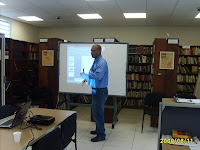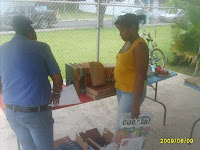


A new chapter
By Pamela Petro
Their first stop: a row of sleek computer terminals, where kids, four or five strong, gather around each screen. Two boys settle down in front of a chessboard, while others pull up chairs at awkward angles. The conference tables take a while to fill up, but soon enough they’re taken too, as homework is pulled out and semi-whispered conversations begin.
Officially, the 1,000-square-foot space has room for thirty patrons, but by the time the lunch hour ends, more than fifty students will have come and gone before heading back to school.
Three years ago, the scene was very different. There were no children lined up outside waiting to get in. The building and land around it were in need of repair and restoration. The library’s collection of 4,000 books was outdated at best, and its few computers didn’t work. All that began to change, though, once a small band of Smith staff, students, alumnae, and faculty rallied to help bring the Loíza Library back to life.
Much of the credit goes to Julio Alves, director of Smith’s Jacobson Center for Writing, Teaching, and Learning. Back in the summer of 2005, he had taken his adopted son, Luis, on a “personal pilgrimage” to Loiza, which Alves suspected was Luis’s ancestral home. Although just fifteen miles from San Juan, in northeast Puerto Rico, Loíza has long been isolated by the Rio Grande de Loíza to the west (which wasn’t bridged until 1983), the Atlantic to the north, and the El Yunque rainforest to the south. Public transportation wasn’t introduced until 2005. The town has a reputation for cultural richness, but also for poverty, violence, and social and economic stagnation. Few Puerto Ricans—and even fewer tourists—ever go there.
When Alves and his son arrived by bus, they found a cheerfully painted but desolate town center. Unemployed men slumped on street corners, stray dogs scratched, and wrought-iron grills covered the windows and doors of every house and shop. Luis wanted to return to their hotel in San Juan, but Alves persisted, intent on visiting the studios of two prominent artists from the area. Hoping to get directions, he poked his head into the library. What he saw saddened him. Bookshelves were pushed up against the windows, there were no patrons, and the librarian was asleep at the desk. “Luis and I debated about whether or not to wake her. He didn’t want to and I did. I won,” Alves jokes. Once she was awake, the librarian proved helpful to Alves but not to a mother and son who came in looking for children’s books written in English. “Sorry, we have none,” she lamented.
Alves made a decision on the spot. “I have enough resources to ship them some books,” he thought. “I don’t need institutional support to be of help. This is something I can do as an individual.”
After returning to Massachusetts, Alves contacted the librarian but never received a reply. A year later, he tried again and got an immediate answer from the library’s new director, Daniel Pizarro, who had grown up in Loíza. His smarts, and his mother’s position as an education administrator, garnered him the best schooling available, making it possible for him to go on to graduate from Colorado State. Though he is quick to credit the work of others, he is clearly the catalyst driving every effort to make the library a success. Together, he and Alves were spark and kindling.
On a second trip to the library, Alves brought with him more than sixty books, including fiction and nonfiction children’s books, and promised more. E-mails to colleagues yielded additional donations, and interest. Professor Ann Zulawski, who teaches Latin American history, visited the library on a research trip and brought along books selected by her husband, an elementary school teacher. Nancy Brady, librarian at Smith’s Campus School, forwarded Alves’s message to Elizabeth Van Houten ’04, a former work-study student at the school’s library who is now project manager at Scholastic Books in New York. Inspired, Van Houten now keeps her eyes open for children’s books in the giveaway bin. When she’s accumulated enough to fill a box, she packs them and sends them to Alves.
The book donations were welcome and appreciated, but any librarian today will tell you that computers are what draw young people—especially teenagers—to the library. Technology at the Loíza Library was almost nonexistent. Knowing that the handful of computers the library owned rarely worked, Alves approached Kate Etzel, Smith’s director of user support and services, and secured three used desktop machines, which he promptly sent to Loíza. Juan Perez, the town’s technology expert, says that for two years the Smith machines served as the backbone of the library’s IT services. “I rebuilt two working computers from parts of our old ones,” he recalls, “but they sometimes broke down. Students used the Smith ones every single day.”
Back on campus, word was spreading among students about Alves’s connection to the Loíza Library. After class one day, he mentioned the effort to Jessica Reyes ’10, who thought, “It would be great if we could help them out.” With Alves’ help, she organized The Loíza Library Link, a student organization that supports the work of the library. The group approached several local bookstores, receiving donations from The Odyssey in South Hadley and Food for Thought in Amherst. The LLL also raised money to buy much-needed magazine subscriptions for the library by offering manicures and massages on “Look and Feel Fabulous Fridays.” Nosotras, Smith’s Latina cultural group, threw a fundraising dance that raised $1,000.
Funds in hand, Reyes, along with Brenda Candelario ’10, Link’s treasurer, and Denisse Martinez ’10 and Amanda Keammerer ’09, co-chairs of Nosotras, met in Alves’s office for a book-buying party. Pizarro had requested general-interest books, young-adult books, and books on nursing and religion, all in Spanish. The first two categories raised the most excitement.
“Let’s get Harry Potter. Everyone reads Harry Potter!”
“Hey, remember La Casa en Mango Street?” Everyone did.
Alves dutifully added the books to his Amazon.com shopping cart.
By the end of their first shopping spree, the students had spent about $500 on books, including classic and contemporary books by Puerto Rican and other Spanish-speaking authors.
Perhaps the greatest contribution of the LLL has been helping Pizarro and Alves—who originally brainstormed the idea—to establish a Praxis internship at the Loíza Library. Praxis is a Smith program that allows all students to undertake non-paying summer internships worldwide. In exchange for 220 hours of work, Praxis interns receive $2,000 from the college. The Loíza Library’s first intern, Chika Okose ’09, arrived there last summer. Recalling her first, hesitant impression of the library, Okose says, “Well, it was a lot smaller than it looked like in pictures on Daniel [Pizarro’s] blog.” It didn’t take long, though, for her to become a favorite of the library’s chief clientele—the children. She even attracted an entourage of five girls, whom she taught to play chess. (Chess is a passion at the library, especially among teenage boys.) “The kids in Loíza have all the potential in the world,” Okose says. “The library is one of the few places where they can develop that potential. That’s why it was important for me to be there.”
Fun and games aside, Okose spent much of her time developing a Friends of the Library project that will secure corporate gifts and donations. Alves believes Okose’s presence alone inspired the entire community—a sentiment Pizarro shares. “You can’t know what it means to us that a student from Smith College came here to live and be part of our effort,” he says. “This town is mired in an ‘island-within-an-island’ mentality. To have attention paid to us by someone from the wider world, like Chika, is important and humbling. It gives us credibility.”
These days, the library is a bright spot in a struggling town. A local designer and landscaper spruced up the exterior of the Art Deco building. Air conditioning has been installed, and so has a security system, but, according to Pizarro, it hasn’t been needed, despite the town’s reputation for gang violence. “[Patrons] have learned to manage their anger in order to stay here,” he says. “That’s the thing I’m proudest of.” Last year, the library received a $25,000 federal technology grant that went toward the purchase of fifteen computers, a server, wi-fi, a projector, and an electronic white board.
In many ways, too, the library has begun to function as a community center. Adults wander in during the day to update their resumes, make photocopies, send a fax, or simply see where their children spend their time. One afternoon a week, Pizarro leads a popular computer class for adults. In fact, during Pizarro’s short tenure, patronage at the library has increased from five to ten clients a day to well over 100.
Elisabeth Doucette ’80, a librarian at the Curtis Memorial Library in Maine and a member of Smith’s Friends of the Libraries, became acquainted with the Loíza Library when she helped Chika Okose on her Friends of the Library project. Doucette says Alves’s effort to help the Loíza Library is important because half a century ago in this country public libraries were where people educated themselves. “And that’s how the Loíza Library is being used today,” she says.
Pizarro has an even grander vision. His mission, which he recites as if it is a mantra, is “to provide a safe haven; to open the world beyond Loíza; and to make Loízans aware of their cultural heritage.” To this, Pizarro and Alves would like to add one more goal: to send a student from Loíza high school—a depressing place with bars on the doors and windows—to Smith.
“Then,” Pizarro says, “we’ll know we accomplished something.”
Pamela Petro is a writer in western Massachusetts. Her profile of psychology professor Patricia Marten DiBartolo ’89 appeared in the Summer 2008 Quarterly.





















